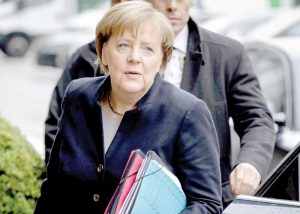Until late on November 19, no one really thought that being a Good Samaritan would make for bad politics. Would a leader who acted humanely be unjustly rewarded with political perdition?
Then, German Chancellor Angela Merkel’s seven-week attempts to cobble together a governing coalition fell apart. And the unspoken truth became clear: Good actions are not necessarily good politics. Merkel’s 2015 act of shining humanity — taking in 1.2 million refugees mainly from Syria — has been rebuked, if not punished outright. At the ballot box in late September, her party did rather less well than expected but still received a plurality vote. Voters also gave the far-right, anti-immigrant, Islam-bashing Alternative for Germany (AfD) party a place in the Bundestag, the first time since immediately after World War II that such a political formulation had achieved this distinction. And Merkel’s attempt to forge a coalition government ran into the cold hard reality of Germany’s suppressed feelings about migrants and refugees.
There is no other way to see the current political impasse. Three of the four parties in the potential coalition — Merkel’s Christian Democratic Union (CDU), its sister outfit, the Christian Social Union (CSU), and the Free Democratic Party (FDP) — tried to outdo each other on a harder line on migration controls. The Greens, the fourth member of the coalition, eventually suggested a compromise: a hard ceiling for annual immigrant numbers, but also the right for migrants already in Germany to be reunited with their families.
By all accounts, the issues that mattered most in the failed coalition talks were, in order of importance, migration policy, the future of coal and regional financial rebalancing.
How did Germany get to the point its government coalition negotiations are deadlocked on the issue of migrants? In 2015 and 2016, many Germans seemed to embrace the immense task of housing and caring for the uninvited new arrivals. Oberhausen is a case in point. The city, in the western region of North Rhine-Westphalia, which took in more refugees in 2015 than anywhere else in Germany, proudly boasted a big welcome culture in the early days of the migrant arrivals.
Merkel announced at a press conference as the multitudes knocked on Germany’s door: “We can do this.” Despite some muttering, the German people stuck with her prescription. Even now, after her coalition talks have fallen through, Merkel remains the country’s second most popular politician after Wolfgang Schauble, president of the Bundestag.
Last year, German political scientists were diagnosing the country’s psychological response to the refugees as acute penance and the need for redemption from history. Germans, they said, remembered the historical stain of the Holocaust, the inhumanity of the Nazis and the experience of German Jewish refugees fleeing in desperation. They were eager to make clear Germany is no longer a country of Nazis and the Syrian refugees provided a way to do this.
It seemed to be paying off. For the past two years, Germany has basked in the awed admiration of the international media. “Germany’s open-door policy in migrant crisis casts nation in a new light,” proclaimed the Los Angeles Times. “Angela Merkel hailed as an angel of mercy,” said the Sydney Morning Herald.
It seemingly marked the next steps in an international rehabilitation project that Germany began in 1948 as a direct reaction to the Holocaust. The Basic Law of that year guaranteed the right to asylum. According to Matthias Mayer of the Integration and Education programme at the Bertelsmann Stiftung foundation, it “reflected the responsibility that the country continues to shoulder for its past… Never should people fleeing persecution or death be denied protection… Germany has prided itself on being a safe haven for those in need.”
So what happened two years after the Syrians and others surged into Germany and received refuge? In Oberhausen, for instance, six months after the migrants arrived, locals were starting to view them as a strain on the local economy. It was not outright hostility but caution.
It would be fair to say this sentiment is now somewhat shared across Germany. Like many other countries, it has mixed feelings and a great many doubts about the influx of outsiders. Politicians in Merkel’s sister party have called the chancellor’s open-door policy an “unprecedented political mistake,” which indicates the level of perceived risk of the humanitarian grand gesture.


